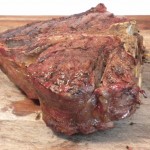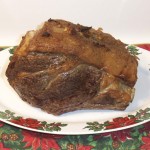In Defense of the Mighty Onion
By Stanley A. Fishman, author of Tender Grassfed Meat and Tender Grassfed Barbecue
Usually I write about meat. But today I am going to rise up in defense of one of our most important vegetables, the mighty onion.
A recent article on the Internet claimed that onions should not be eaten, claiming that onions have little nutritional value.
The overwhelming majority of our ancestors valued onions as one of their most important foods, using them for all kinds of culinary and healing purposes. I side with our ancestors on this one.
Onions Are Nutritious
The claim that onions are not nutritious is apparently based on the content of detectable vitamins and minerals. There are two problems with this claim.
The first problem is that researchers are constantly discovering new nutrients and substances in plants. Many of the nutrients we recognize today were unknown twenty years ago, or even five years ago. The discovery process continues.
Second, onions contain unique substances whose effect has not been fully researched. Some research has shown that onions have anti-bacterial and anti-inflammatory properties. These substances may have additional beneficial effects. Our ancestors certainly thought so.
Onions Are Traditional Food
If you research the world’s cuisines, as I have done for many years, you will find that onions may be the most used and most popular vegetable in history.
Onions were a vital part of the cooking of the ancient Egyptians, ancient Romans, ancient Greeks, ancient Chinese, ancient Celts, and just about every other significant ancient people we know of. Most of these peoples believed that onions were vital for their health and well being. Onions were used in marinades, stews, stir-fries, roasts, braises, and soups, and most meat dishes contained their share of onions.
Onions were also used for the following purposes:
- Issued as rations to soldiers, to make them strong, and keep them healthy
- As a medicine against a whole variety of ailments, especially colds and the flu
- To improve the taste of organ meats
- To tenderize meat, often being juiced for his purpose
- To purify and preserve food
Onions Are Widely Used By Traditional Cooks
Every modern cuisine I have studied, from Europe to Asia, to Africa, to South America, the Caribbean, and just about everywhere else, makes extensive use of onions in their traditional cuisines. Onions are widely used in meat dishes, vegetable dishes, soups, broths, curries—wherever you have traditional cooking, onions appear.
Onions Make Grassfed Meat Taste Better
I have found onions, whether yellow, red, or green, to be invaluable for tenderizing and flavoring grassfed meat. Nearly all of my stews, pot roasts, meatloaves, stir-fries, and most of my roasts contain onions in one form or another. My favorite vegetable to eat with grassfed meat is onions fried in plenty of butter, which I love.
I could go on and on about onions, but this will do for now.
I love onions!
This post is part of Fat Tuesday and Real Food Wednesday blog carnivals.


 Photos of recipes from the new book Tender Grassfed Barbecue
Photos of recipes from the new book Tender Grassfed Barbecue
 Photos of recipes from the cookbook Tender Grassfed Meat
Photos of recipes from the cookbook Tender Grassfed Meat
